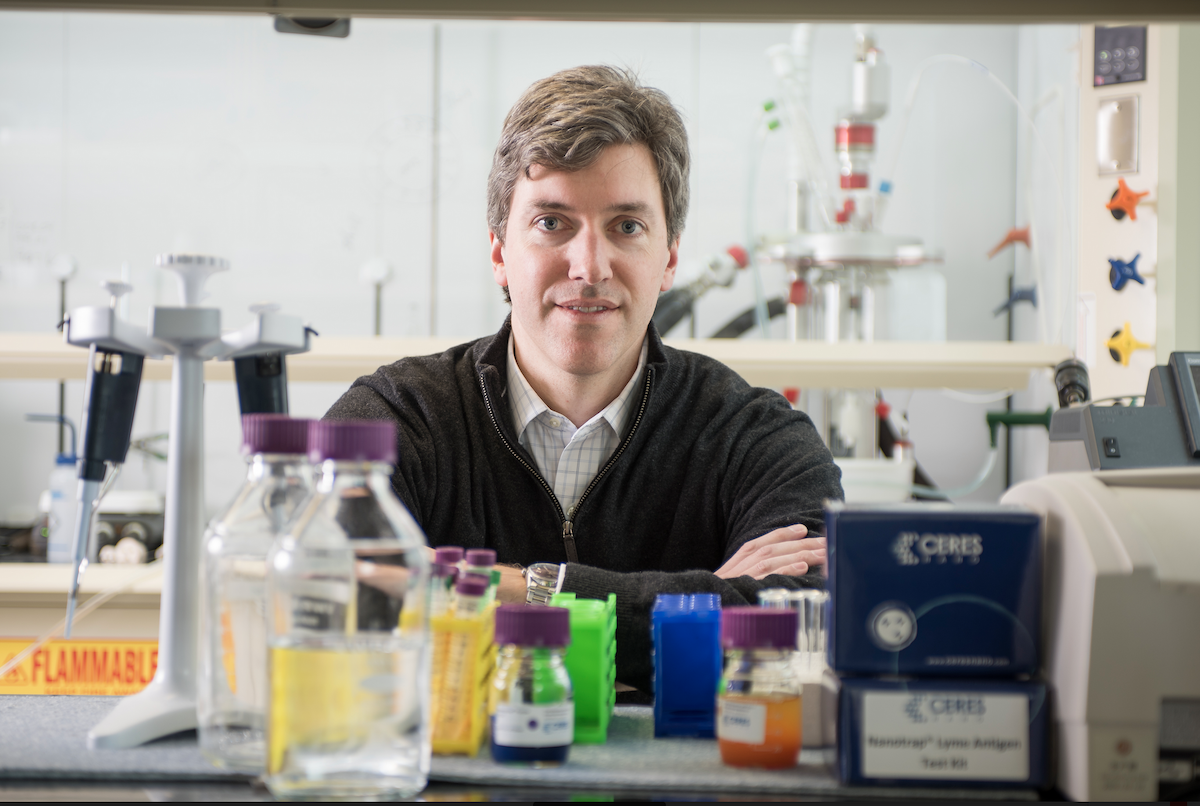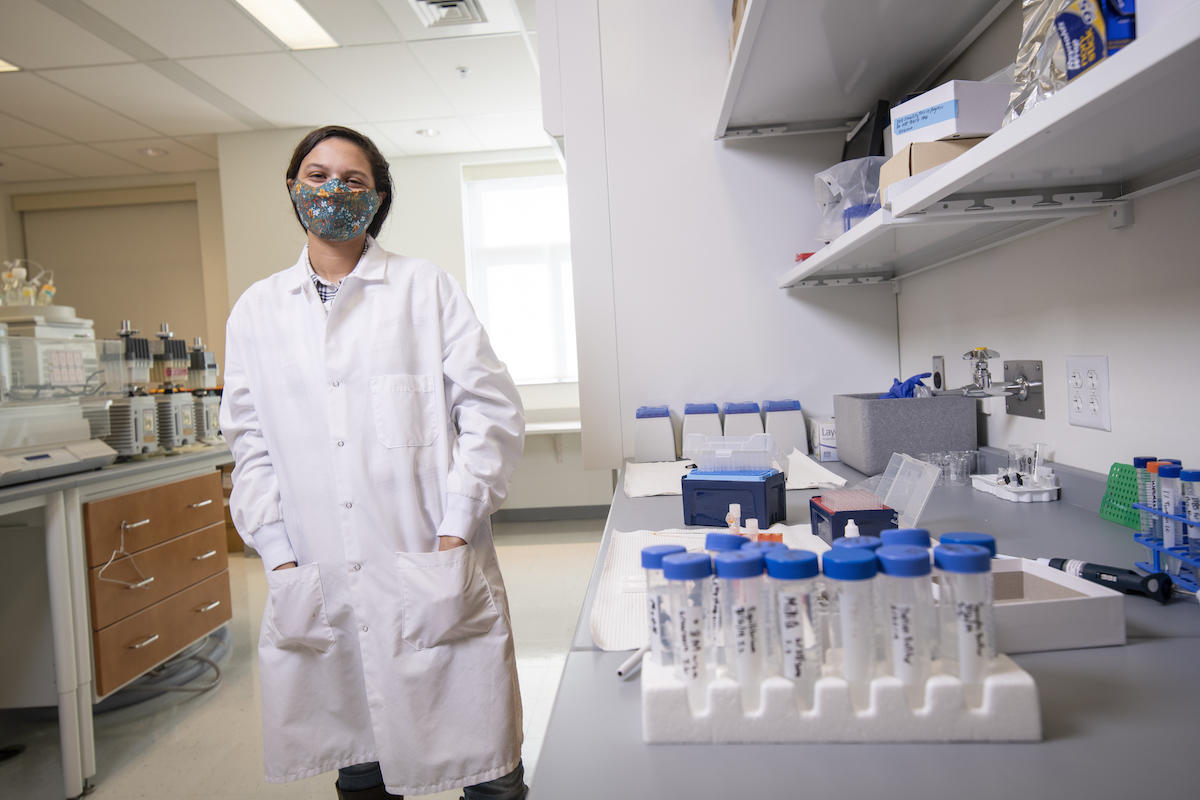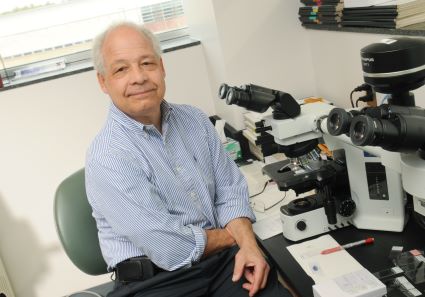Mason start-up Ceres Nanosciences experiences big wins and increases footprint in Prince William County
Colleen Rich
Tue, 04/20/2021 – 08:49
Ross Dunlap is CEO of Ceres Nanosciences and a member of the George Mason Research Foundation board. Photo provided
Ceres Nanosciences, a Northern Virginia bioscience company spun out of George Mason University that specializes in diagnostic products and workflows, has opened a 12,000-square-foot advanced particle manufacturing plant in Prince William County’s Innovation Park. The new facility increases the manufacturing capacity of Ceres’ Nanotrap® Magnetic Virus Particles, which improve diagnostic testing for viruses like SARS-CoV-2, influenza, and respiratory syncytial virus.
The completion of the new facility also reflects the partnership between Mason and the Prince William County Department of Economic Development (PWCDED).
“The PWCDED has a long-standing relationship with Mason, specifically with the Science and Technology Campus that anchors our bioscience hub in Innovation Park,” said Christina Winn, executive director of PWCDED. “Ceres was the first company to graduate our Science Accelerator, and we are invested in their growth as a leader, collaborator and innovator in our life sciences industry cluster.”
The construction of the facility, which was completed in under four months, was funded by the National Institutes of Health (NIH) Rapid Acceleration of Diagnostics (RADx) initiative to expedite the production and commercialization of diagnostic tests for the SARS-CoV-2, the virus that has become known as COVID-19. Prince William County also supported the swift development of the site.
“We’re immensely grateful for the NIH funding that supported this new facility,” said Ross Dunlap, Ceres Nanosciences CEO. “Not only are we now able to deliver a robust supply of this critical reagent that the industry needs, but the facility also is a major element of Ceres’ long-term growth plan.”
Dunlap and his team have noticed significant gaps in the diagnostics industry and infrastructure in the United States, especially in response to an outbreak. He hopes that because the Nanotrap® Magnetic Virus Particles reduce sample processing time, eliminate the need for special kits, and create cost efficiencies, the technology can be leveraged to respond faster to future pandemics.
The Ceres Nanosciences production team. Photo provided
“It was very fortunate that we had put a lot of energy into developing the technology for viral infections and released a product for it before the pandemic, not even knowing that COVID-19 would come about,” said Dunlap, who serves on the George Mason Research Foundation board. “We were able to rapidly respond and quickly validate our technology for COVID diagnostics, which was done in partnership with Mason.”
The base technology underlying the Nanotrap® particle was created by Mason’s Center for Applied Proteomics and Molecular Medicine (CAPMM), which is led by co-directors Lance Liotta and Emanuel Petricoin. The technology was funded with a series of NIH grants from the NIH lnnovative Molecular Analysis Technologies (IMAT) program.
It was then licensed to Ceres Nanosciences in 2008. Follow-on funding to advance the technology was awarded to the Ceres and Mason team by the NIH, the Center for Innovative Technology, Virginia Catalyst, the Bill and Melinda Gates Foundation and the Department of Defense.
“We are very proud to see that a technology developed under NIH funding at Mason has graduated to a product that is aiding in the fight against COVID-19 and promises to help patients all around the world for many other diseases,” said Alessandra Luchini, associate professor for CAPMM and co-inventor of the Nanotrap®.
With the assistance of Mason researchers, who played a large role in efforts such as testing particles and generating data, the technology evolved into a platform that can be modified and adapted to different applications, such as infectious diseases. For example, in 2015, Mason CAPMM scientists and Ceres Nanosciences demonstrated the use of the Nanotrap® technology for the detection of Lyme disease. Today, the Lyme Borrelia Nanotrap® Antigen Test is offered by Galaxy Diagnostics, a medical laboratory that specializes in tests for flea- and tick-borne pathogens.
“Mason has a lot to offer when it comes to cutting-edge technologies,” said Hina Mehta, director of the Office of Technology Transfer. “We are always looking for the right partners, like Ceres Nanosciences, who can take our research discoveries to commercial-grade products that benefit the public.”
Ceres Nanosciences and Mason have worked together since the company’s genesis. Ceres’ first lab was on Mason’s Science and Technology Campus, and the two organizations have collaborated on numerous research projects.
“Mason has consistently been a resource that we go to when we need extra support and research power,” said Dunlap. “The researchers have a range of backgrounds that we need: from virology to microbiology to proteomics. Their areas of expertise have been critical across a lot of our development programs.”
Dunlap said he and his team, along with continued support from Mason, are eager to help people return to pre-pandemic life.
“Our team is incredibly excited and motivated to come to work every day and produce these particles so that people can go back to work and school,” said Dunlap. “We’re proving why this technology has such value and why it can do so much for public health.”



